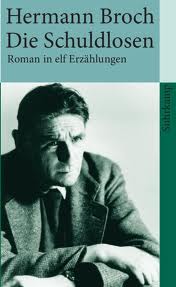Hermann Broch's last work, Die Schuldlosen: Ein Roman in elf Erzählungen (1950) ("The Guiltless Ones: A Novel in Eleven Stories") is a challenging book for any reader, which is why it is probably Broch's least-known – and least-examined – novel. The 11 stories were written over 3 decades, but 5 were completed while Broch was in exile at Yale University, and the novel was published just months before Broch's death in 1951.
Die Schuldlosen lacks the epic sweep and narrative cohesion of Broch's masterpiece trilogy Die Schlafwandler; the novel follows just half a dozen characters in ten-year intervals beginning in 1913. But Die Schuldlosen deals with Broch's grand theme of individuals who are both the pawns, but also the unwitting agents, of historical forces. In some ways Die Schuldlosen is the sequel to Huguenau oder die Sachlichkeit, the final novel of Die Schlafwandler, with Broch's philosophical musings on Der Zerfall aller Werte – the disintegration of all values. Die Schuldlosen depicts the world that comes after the collapse of values – the immoral age and triumph of Kitsch which leads inexorably – as Broch writes in the 9th story, entitled 1933, to the concentration camp (the Nazis briefly held Broch in a concentration camp in 1938).
In the immediate postwar period and in the aftermath of the Nuremberg Trials Broch was preoccupied with the questions of justice and guilt – especially the concept of collective guilt. Who or what was to blame for the rise of the Nazis? So the title of the book – Die Schuldlosen / The Guiltless Ones – is bitterly ironic. For all the key characters in the novel – with the exception of the Old Beekeeper and his granddaughter Melitta – are guilty. The novel is typology of guilt – ranging from A to Z, from the central figure Andreas – or A., as he is also called – to the math teacher Zacharias and the maid Zerline.
Andreas is a young, successful diamond dealer who, at the height of the Weimar hyper-inflation, turns up in an unnamed central German city and moves in with the Baroness and her unwed daughter who are forced to take in boarders after the inflation wiped out their fortune. They still employ the services of Zerline, a middle-age, scheming maidservant who had joined the household already as a young woman. From Zerline Andreas learns of the sordid past of the Baroness, her adulterous affair with a playboy that produced the daughter Hildegard.
In one story (DIe vier Reden des Studienrats Zacharias) Andreas encounters the prototype Nazi (and, ironically stalwart Social Democrat) Zacharias and is subjected to his reactionary tirades.
While Zacharias is the only overtly political and therefore the most obviously "guilty" figure in the novel with respect to the German debacle, he is a pathetic character who evidently enjoys being beaten by his wife. The most fully-realized character is the maid Zerline, a force of nature who effortlessly manipulates or dispatches anyone to get what she wants. She procures and then corrupts the innocent young Melitta, and then engineers her suicide. Eventually she tricks her employer – the Baroness – into taking a fatal overdose and takes her place as mistress of the house.
In the climatic 10th story (Steinerner Gast) which takes place after the Nazis have seized power, we find Andreas living in a mother-son relationship with the Baroness. He has grown grotesquely obese thanks to Zerline's cooking and spends his days managing his money. Only with the sudden appearance of the blind beekeeper is he finally forced to admit his guilt – for his role in the death of Melitta but also for the general drift of his world into brutal fascism. It is the guilt not of action, but inaction, the guilt of apathy (Gleichgültigkeit) and moral lassitude:
Das politische Untier Hitler kam vor meinen Augen Schritt für Schritt zur Herrschaft, und ich machte Geld. Das war meine Mannesleistung, faslche Härte und echte Schuld. Wahrlich, selbst wenn Nicht-Arbeit keine Schuld wäre, die Heuchelei ist es. Und das habt ihr zu begreifen.
(The political monster Hitler came step by step to power and I made money. That was my big achievement, fake rigor but genuine guilt. Honestly, even if not-working is not guilt it is hypocrisy. You must understand this.)
The beekeeper/grandfather gently encourages Andreas to take responsibility for his guilt; he promptly puts a bullet through his temple and collapses in the form of the St. Andrew's Cross, a recurring image in the novel. But Andreas is the exception; the only one who achieves a measure of insight into his guilt. The other "guiltless ones" live on triumphantly, perhaps reflecting Broch's pessimism for the postwar era.
Die Schuldlosen is a complex work of fiction comprised of parables, verse, philosophical digressions, layered with symbolism. A complete analysis and interpretation would require a book-length study. But, as with Die Schlafwandler and Tod des Vergil, readers willing to invest the time and effort are richly rewarded.


